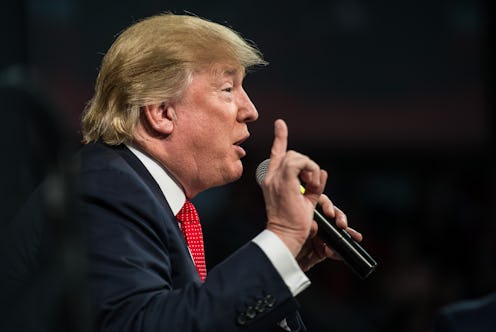News
Start Worrying About Trump's Poll Numbers
Despite what the Republican establishment had repeated over and over in the early days of the 2016 presidential campaign, there now seems to be ample reason for them to panic. A Donald Trump primary nod is starting to look more realistic, and according to Trump's rising polls numbers, which should scare everyone at this point, even a host of racist and sexist comments can't stop the billionaire mogul's roll. In fact, those same comments seem to be doing the exact opposite, bolstering his already-solid lead in the crowded Republican field.
A new Monmouth University poll released Monday showed that Trump had opened a wide berth over his rival GOP candidates, with 41 percent of the prospective vote. His closest rival, Ted Cruz, managed to scrape just 14 percent.
"It has become abundantly clear that Trump is giving his supporters exactly what they want, even if what he says causes the GOP leadership and many Republican voters to cringe," Monmouth Director Patrick Murray said in a statement. Murray also brushed off suggestions that Trump's lead stemmed from a large bloc of "under-educated" voters. "Trump voters may skew toward a lower educational level, but it’s important to keep in mind that he draws support from significant segments of every voting bloc. You simply can’t pigeonhole his supporters as representing one or two particular factions of the party."
Trump's rise hasn't been nearly as aggressive in similar polls of late. Conversely, a Bloomberg Politics / Des Moines Register poll Saturday showed rival Ted Cruz at 31 percent — a 10 percentage point lead over Trump, who garnered just 21 percent. On Monday, a Fox News poll also showed Cruz edging out Trump by 2 percentage points, with 28 percent to Trump's 26. Still, the fact of the matter remains: So far, Trump has been nearly unbeatable. What makes Cruz so special?
Consider Ben Carson's late-fall surge. While many analysts pegged Carson's sudden popularity to Trump's potentially dwindling supporter base (which they claimed had grown tired of Trump's bigoted and insensitive antics), it wasn't too long before Carson's numbers plummeted once more. Perhaps he couldn't handle the pressure, or perhaps it was his lackluster debate showings that did him in. Whatever the case, Carson was soon a largely forgettable face once more in the chaotic GOP race, and Trump was back on top.
Some argue, as they have since the beginning, that the Trump train will soon run out of steam. But that has yet to happen, despite a bevy of attacks from Trump's fellow GOP candidates and threats of a broken convention by the Republican establishment.
"[Trump's] leads aren’t meaningless, but, historically, similar levels of support have been more likely to end with a share of the national vote that wasn’t enough to win the nomination," argued FiveThirtyEight's Harry Enten in a column Monday, comparing Trump's iron grip with former New York Mayor Rudy Giuliani's promising lead in 2007. (Giuliani eventually lost that lead to John McCain.) Still, he admitted that while Trump "doesn’t have a single endorsement from a governor or member of Congress," that doesn't necessarily mean he'll lose. "Trump could easily end up with 20 percent or 30 percent of the national primary vote based on his polling right now. He could also win."
An even more likely scenario? If the GOP continues to threaten Trump's reign over the party, it could cause a sudden fracturing in the already-beleaguered conservative base, with Trump taking his 41 percent with him to Independent Island. And if that happens, voters can officially kiss the once-great Grand Old Party goodbye, and get ready to relearn what it means to be a Republican.
